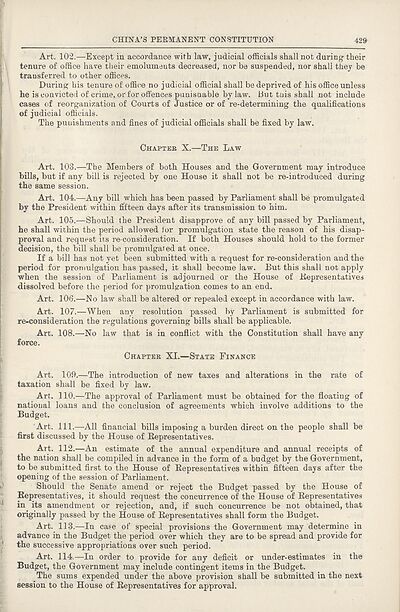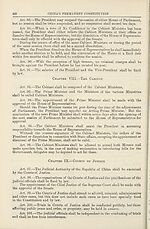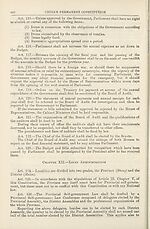1927
(483) Page 429
Download files
Complete book:
Individual page:
Thumbnail gallery: Grid view | List view

CHINA’S PERMANENT CONSTITUTION
42»
Art. 102.—Except in accordance with law, judicial officials shall not during their
tenure of office have their emoluments decreased, nor be suspended, nor shall they be
transferred to other offices.
During his tenure of office no judicial official shall be deprived of his office unless
he is convicted of crime, or for offences punisnable by law. But tuis shall not include
cases of reorganization of Courts of Justice or of re-determining the qualifications
of judicial officials.
The punishments and fines of judicial officials shall be fixed by law.
Chapter X.—The Law
Art. 103.—The Members of both Houses and the Government may introduce
bills, but if any bill is rejected by one House it shall not be re-introduced during
the same session.
Art. 104.—Any bill which has been passed by Parliament shall be promulgated
by the President within fifteen days after its transmission to him.
Art. 105.—Should the President disapprove of any bill passed by Parliament,
he shall within the period allowed for promulgation state the reason of his disap¬
proval and request its re consideration. If both Houses should hold to the former
decision, the bill shall be promulgated at once.
If a bill has not yet been submitted with a request for re-consideration and the
period for promulgation has passed, it shall become law. But this shall not apply
when the session of Parliament is adjourned or the House of Representatives
dissolved before the period for promulgation comes to an end.
Art. 106.—No law shall be altered or repealed except in accordance with law.
Art. 107.—When any resolution passed by Parliament is submitted for
re-consideration the regulations governing bills shall be applicable.
Art. 108.—No law that is in conflict with the Constitution shall have any
force.
Chapter XI.—State Finance
Art. 109.—The introduction of new taxes and alterations in the rate of
i taxation shall be fixed by law.
Art. 110.—The approval of Parliament must be obtained for the floating of
national loans and the conclusion of agreements which involve additions to the
Budget.
Art. 111.—All financial bills imposing a burden direct on the people shall be
first discussed by the House of Representatives.
Art. 112.—An estimate of the annual expenditure and annual receipts of
the nation shall be compiled in advance in the form of a budget by the Government,
I to be submitted first to the House of Representatives within fifteen days after the
opening of the session of Parliament.
ti Should the Senate amend or reject the Budget passed by the House of
Representatives, it should request the concurrence of the House of Representatives
1 in its amendment or rejection, and, if such concurrence be not obtained, that
originally passed by the House of Representatives shall form the Budget.
Art. 113.—In case of special provisions the Government may determine in
advance in the Budget the period over which they are to be spread and provide for
C the successive appropriations over such period.
Art. 114.—In order to provide for any deficit or under-estimates in the
Budget, the Government may include contingent items in the Budget.
The sums expended under the above provision shall be submitted in the next
session to the House of Representatives for approval.
42»
Art. 102.—Except in accordance with law, judicial officials shall not during their
tenure of office have their emoluments decreased, nor be suspended, nor shall they be
transferred to other offices.
During his tenure of office no judicial official shall be deprived of his office unless
he is convicted of crime, or for offences punisnable by law. But tuis shall not include
cases of reorganization of Courts of Justice or of re-determining the qualifications
of judicial officials.
The punishments and fines of judicial officials shall be fixed by law.
Chapter X.—The Law
Art. 103.—The Members of both Houses and the Government may introduce
bills, but if any bill is rejected by one House it shall not be re-introduced during
the same session.
Art. 104.—Any bill which has been passed by Parliament shall be promulgated
by the President within fifteen days after its transmission to him.
Art. 105.—Should the President disapprove of any bill passed by Parliament,
he shall within the period allowed for promulgation state the reason of his disap¬
proval and request its re consideration. If both Houses should hold to the former
decision, the bill shall be promulgated at once.
If a bill has not yet been submitted with a request for re-consideration and the
period for promulgation has passed, it shall become law. But this shall not apply
when the session of Parliament is adjourned or the House of Representatives
dissolved before the period for promulgation comes to an end.
Art. 106.—No law shall be altered or repealed except in accordance with law.
Art. 107.—When any resolution passed by Parliament is submitted for
re-consideration the regulations governing bills shall be applicable.
Art. 108.—No law that is in conflict with the Constitution shall have any
force.
Chapter XI.—State Finance
Art. 109.—The introduction of new taxes and alterations in the rate of
i taxation shall be fixed by law.
Art. 110.—The approval of Parliament must be obtained for the floating of
national loans and the conclusion of agreements which involve additions to the
Budget.
Art. 111.—All financial bills imposing a burden direct on the people shall be
first discussed by the House of Representatives.
Art. 112.—An estimate of the annual expenditure and annual receipts of
the nation shall be compiled in advance in the form of a budget by the Government,
I to be submitted first to the House of Representatives within fifteen days after the
opening of the session of Parliament.
ti Should the Senate amend or reject the Budget passed by the House of
Representatives, it should request the concurrence of the House of Representatives
1 in its amendment or rejection, and, if such concurrence be not obtained, that
originally passed by the House of Representatives shall form the Budget.
Art. 113.—In case of special provisions the Government may determine in
advance in the Budget the period over which they are to be spread and provide for
C the successive appropriations over such period.
Art. 114.—In order to provide for any deficit or under-estimates in the
Budget, the Government may include contingent items in the Budget.
The sums expended under the above provision shall be submitted in the next
session to the House of Representatives for approval.
Set display mode to:
![]() Universal Viewer |
Universal Viewer | ![]() Mirador |
Large image | Transcription
Mirador |
Large image | Transcription
Images and transcriptions on this page, including medium image downloads, may be used under the Creative Commons Attribution 4.0 International Licence unless otherwise stated. ![]()
| Asian directories and chronicles > 1927 > (483) Page 429 |
|---|
| Permanent URL | https://digital.nls.uk/196517319 |
|---|
| Attribution and copyright: |
|
|---|---|
| Description | Volumes from the Asian 'Directory and Chronicle' series covering 1917-1941, but missing 1919 and 1923. Compiled annually from a multiplicity of local sources and research. They provide listings of each country's active corporations, foreign residents and government agencies of all nationalities for that year, together with their addresses. Content includes: various treaties; coverage of conflicts; currencies and taxes; consular fees; weights and measures; public holidays; festivals and traditions. A source of information for both Western states and communities of foreigners living in Asia. Published by Hongkong Daily Press. |
|---|---|
| Shelfmark | H3.86.1303 |
| Additional NLS resources: |

